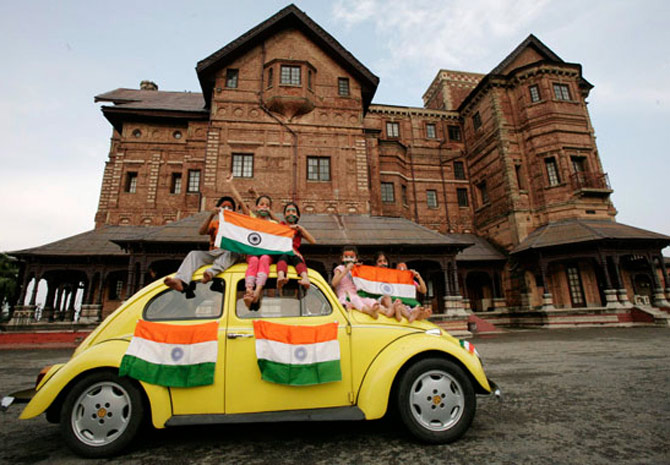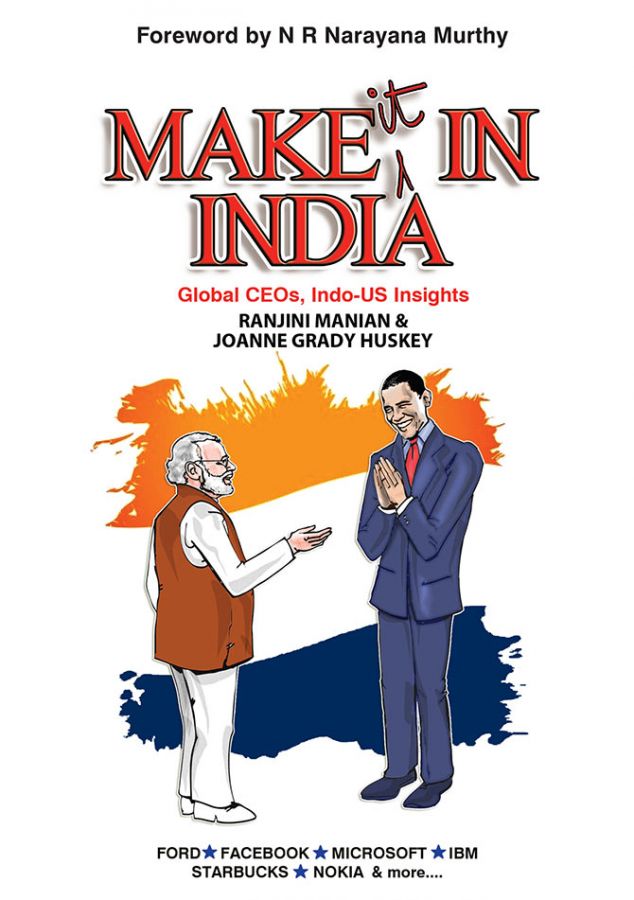"Most of us from India speak fast and our accent varies depending on the region we come from."
"Do not oversell the India story and undersell the challenges that India faces."
"Stay true to the business and the intent."
"It does not necessarily mean that by calling someone by their first name you are closer, or by addressing them as Sir or Ji you are extremely formal."
The book Make It In India: Global CEOs, Indo-US Insights is filled with interesting nuggets of wisdom like these. Read on...

Two successful women -- Ranjini Manian, founder and CEO and Joanne Grady Huskey, co founder, Global Adjustments -- have authored the book Make It In India: Global CEOs, Indo-US Insights which compiles the collective wisdom of 12 successful CEOs from across domains.
Global Adjustments is a leading international organisation that assists individuals and businesses from across the globe with cross cultural training and the book is an attempt to acknowledge different work cultures, professional concerns and offer solutions.
With interesting insights on human resource practices, human relations issues and gender augmentation, the book Make in India published by Westland explains what it takes for a successful international company to prosper and thrive in today's India.
For those who haven't bought the book, we bring you interesting excerpts from the book that is sure to inspire you.
You never get a second chance to make a first impression," goes a popular saying.
This chapter will give you some clues about how to make that first contact between an American and an Indian business person go well.
The desired result is to meet the expectations of courtesy on both sides, and, hopefully, for the first meeting to lead on to several more.
People like to do business with people who are like them, or with people they like.
In this chapter, CEOs give insights on how an American can be well received from the word go by an Indian, and how the Indian can make that first meeting with an American, one that builds a lasting relationship.
Going step by step, from appearances, through body language, forms of address and conversation, to gift-giving, and ending with overall first impressions, this section offers a starter kit to sailing through that crucial initial meeting.

How can Indians and Americans make a positive first impression on one another?
Ravi Venkatesan, former chairman, Microsoft India
I went to the US in 1985, when I was twenty years old, I had no money, and Indians were not as abundant as they are today.
I used to be one of only two Indians in a large group, and I had to fit in.
What I discovered, as a person coming into any dominant culture, is that it is extremely important to be humble, because you don't know enough.
The second ingredient is to have curiosity about the other and learn from the word go.
Thirdly, do be authentic -- don't be apologetic.
I have no respect for Indians who develop a twangy accent.
There is no point in being unnatural.
Don't try to be something you are not, and the first impression will lead to many more successful layers in business.
Tips from Global Adjustments
Prepare an 'Elevator Speech'.
Write down in 50 words or less, who you are, and what you do, and practice saying it, so that it comes out naturally when you meet anyone for the first time.
Even if it is the President of the United States or the Prime Minister of India you have to be ready with an interesting pitch -- and all you have is the time it takes for an elevator (or 'lift' as it is called in India) to get from the 20th floor down to earth.
This elevator pitch can really take you places!
***
Shanker Annaswamy, former managing director, IBM India
In my career spanning over thirty-six years, I was fortunate to work for almost a decade each in three great global companies -- Philips, GE and IBM.
In all the three companies there were opportunities for employees to work with colleagues of different cultural backgrounds and at different locations across the world.
Generally, most of the companies train their employees on soft and communication skills.
From my learning and experience, I would focus on the following three areas:
a. Always prepare -- As they say, the first impression is the best impression.
Apart from preparing for the meeting objectives, it would help to know about the educational/technical/ cultural background of the person.
Knowledge of the person's language, hobbies and other interests helps to build some connections.
b. Speak slowly -- Most of us from India speak fast and our accent varies depending on the region we come from.
It would help immensely if we speak clearly and slowly in a measured manner, so that the other person understands us better.
c. Listen actively -- For some of us, our listening skills are not the best!
Our minds tend to wander off to the next topic after we ask a question, instead of listening and paying attention to the speaker.
***
Kirthiga Reddy, managing director, Facebook India
There are often opportunities for our Facebook teams to hold one-on-ones with key players on both sides, and they come out and say, "I don't know if I really used that one-on-one very effectively."
My advice has always been to go in with a message, take the time to put your thoughts down about what is it you want the other person to leave with.
Think of the areas of challenge you have, and think about places this person can help -- especially visitors from headquarters.
Everyone is eager to help and make a difference.
Most of all, stay true to the business and the intent, don't go down the path of visibility for visibility's sake, because people can see through that.
Tips from Global Adjustments
Getting names right is a fun challenge.
Western names are best remembered written down, then practiced so that they are pronounced right.
For instance, we needed to put an effort into remembering that our VIP client Bezos's name was pronounced "Bay-Zos" and not "Beesoz."
Among Indian names, the top businessman Nandan Nilekani's name was one spelling we repeatedly got wrong until we were able to link it with the river "Nile".
For the Western ear, some Indian names are too complicated to remember -- one like Jayakrishna Hariharan, for instance.
In such cases, breaking them down into syllables makes it a little easier. Or simply reduce it to initials -- JKH, after seeking permission from the person concerned, as he or she will willingly oblige.
Stuart Milne, CEO, HSBC
One of the things I recommend to my people, who have internal and external meetings, is that they remain factual, not to oversell the India story and not undersell the challenges that India faces.
Sometimes, Indian colleagues can push the India story too much, when actually, outsiders are aware of opportunities, but also want to know the risks.
It is about coming across as somebody who has something useful to say, not regurgitating a line, but giving useful advice.
As bankers, we often advise customers on strategies to execute, to succeed despite the idiosyncrasies that exist.
Broadly speaking, there tends to be a lot of talk, but translating it into action is harder.
I advise foreigners coming here that they won't find a more intelligent bunch of people than Indians anywhere -- very motivated to succeed -- but at the same time everybody wants to be the chief and not everyone is as focused on execution.
Going from cool strategy stuff, to bringing them down to earth to execute, has to be incorporated into the leadership mentoring style of expats coming to lead teams here.
***
At a business meal, how can an Indian hold his or her own as a vegetarian teetotaler?
Krishna Kumar, former chairman, Tata Starbucks
So long as you don't have an inferiority complex, it is never an issue. I have seen senior leaders in Europe and the US, who respect your sense of dignity and purpose.
So just hold your own. Don't be defensive.
Your personal preference is your own.
It doesn't make you any higher or lower.
In the US too, people are choosing to be vegetarian or even vegan (no meat or dairy) so, the concept is more accepted these days.
Sip juice or club soda while others drink a glass of wine.
Learn to relish a salad and sandwich as a vegetarian and not be stuck on hot look-alike Indian food.
Indians don't use first names easily. They address seniors as 'Sir' or add the suffix 'Ji' to their name. How do I explain to the American not to take this as bureaucracy or being overly formal?
Shanker Annaswamy, former managing director, IBM India Private Limited
In India, based on regional and cultural practices, it is common to address seniors as Sir or Ji, even if we have known them for many years and have close relationships.
In America, in similar situations, people would like to be addressed by their first name.
The common error Americans make is to judge someone else calling me Mr Annaswamy as a reflection of a hierarchical management style, while it is merely a simple form of address here in India.
It does not necessarily mean that by calling someone by their first name you are closer, or by addressing them as Sir or Ji you are extremely formal.
Published with the kind permission of Westland Books.
The book, priced at Rs 250 is available at all leading book stores in the country.
Lead image used for representational purposes only.
Photograph: Reuters











 © 2025
© 2025